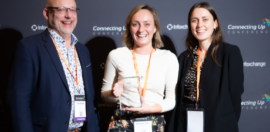Grants Help Improve Indigenous Health
21 October 2014 at 9:42 am
Health and medical researchers have teamed up with Indigenous aid agencies, policymakers, businesses to help improve the health of Indigenous communities, as part of five grants announced today.
The grants are co-funded by the National Health and Medical Research Council (NHMRC) and partners, which includes the Aboriginal Medical Services Alliance Northern Territory, Ngaanyatjarra Health Service, Ernst and Young, the Northern Territory Department of Health, amongst others.
Of the $7 million distributed through the Partnership Projects scheme, over $5 million was awarded to researchers to investigate ways to improve the health outcomes of Indigenous Australians – described as the largest proportion allocated for this purpose in the history of the scheme.
The grants were part of a $539.8 million announcement by Prime Minister Tony Abbott and Minister for Health Peter Dutton, for 773 grants across a broad range of diseases and health conditions.
The indigenous grants aim to find ways to improve access to dialysis treatments, improve development outcomes for children, reduce cardiovascular inequality and improve testing of sexually transmitted diseases.
CEO Professor Warwick Anderson said he was optimistic that the research would result in improved health care for Aboriginal and Torres Strait Islander people.
“It is in everyone’s interest that we close the gap in Indigenous health outcomes. So it’s great to see this commitment from a broad spectrum of Indigenous groups, organisations and governments to work with researchers to develop solutions to health issues central to Indigenous communities,” Professor Anderson said.
The grants are part of the NHMRC’s commitment to improving health outcomes of Indigenous Australians by ensuring that at least five per cent of its annual research budget is directed to research directly aimed at improving the health of Indigenous Australians.
As well as the Partnership Projects, there was also $43 million marked for Indigenous health research from other schemes to tackle diseases such as chronic kidney disease, fetal alcohol spectrum disorder and cardiovascular disease.
Partnership Project Summaries
Professor Sven Silburn, Menzies School of Health Research, child development ($924,761)
This project will combine data from health, education, child protection and justice agencies to improve developmental outcomes of Northern Territory children and to develop ways to reduce outcome gaps between Indigenous and non-Indigenous children in areas such as health and education.
Partners:
Aboriginal Medical Services Alliance Northern Territory
Northern Territory Department of Children and Families
Northern Territory Department of Education
Northern Territory Department of Health
Professor Alan Cass, Menzies School of Health Research, kidney disease ($1,160,334)
Indigenous Australians living in remote areas suffer end-stage kidney disease at rates up to 30 times the national average and many have to relocate to urban areas to access treatment, at great expense. This project will compare different models of dialysis care and investigate the financial, social-economic and quality of life impacts of each model on patients, family and key stakeholders.
Partners:
Aboriginal Medical Services Alliance Northern Territory
Ernst and Young
Northern Territory Department of Health
Northern Territory Department of Housing
Western Desert Nganampa Walytja Paylantjaku Tjutaku
Associate Professor Rebecca Guy, University of New South Wales, sexually transmitted infections ($1,406,911)
It is estimated that at any given time, half of all young people in remote Aboriginal communities have a sexually transmissible infection (STI) that could be easily treated with antibiotics. This project aims to better control the spread of STIs and improve health outcomes by implementing point-of-care testing and treatment for STIs in 20 Aboriginal primary health services in regional and remote areas of Western Australia over a 5-year period.
Partners:
Cepheid
Kimberley Aboriginal Medical Services Council
Ngaanyatjarra Health Service
The Aboriginal Health Council of Western Australia
Western Australia Department of Health
Professor Andrew Lloyd, University of New South Wales, hepatitis C ($1,495,101)
Hepatitis C is associated with considerable morbidity, mortality and health-related costs, but recent advancements show antiviral therapy is an effective prevention strategy for high-risk populations. This project will survey and treat hepatitis in the prison environment, given that population’s large burden of chronic infection, with high ongoing transmission rates and a lack of effective prevention strategies.
Partners:
Corrective Services NSW
Gilead Sciences
Hepatitis NSW
Justice Health and Forensic Mental Health Network
NSW Health
NSW Users and AIDS Association
Professor Emily Banks, Australian National University, cardiovascular disease ($527,968)
This project will identify and prioritise points for intervention to reduce cardiovascular disease inequalities in Australia across four domains of disadvantage: socioeconomic status, Aboriginality, remoteness and mental health. The team will also conduct a systematic review of the effectiveness of various cardiovascular disease interventions, with the aim of improving health and reducing health inequalities.
Partners:
The Agency for Clinical Innovation
The Consumers Health Forum of Australia
The Heart Foundation
More information about the grants can be found on the NHMRC website under Outcomes of funding rounds.







